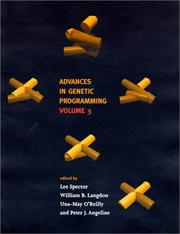| Listing 1 - 2 of 2 |
Sort by
|

ISBN: 9780262194235 9780262290791 9780262284127 026228412X 0585159009 9780585159003 0262194236 0262194236 0262290790 0262011581 9780262011587 Year: 1999 Publisher: Cambridge, Massachusetts : MIT Press,
Abstract | Keywords | Export | Availability | Bookmark
 Loading...
Loading...Choose an application
- Reference Manager
- EndNote
- RefWorks (Direct export to RefWorks)
Genetic programming, a form of genetic algorithm that evolves programs and program-like executable structures, is a new paradigm for developing reliable, time- and cost-effective applications. The second volume of Advances in Genetic Programming highlights many of the most recent technical advances in this increasingly popular field.Genetic programming, a form of genetic algorithm that evolves programs and program-like executable structures, is a new paradigm for developing reliable, time- and cost-effective applications. The second volume of Advances in Genetic Programming highlights many of the most recent technical advances in this increasingly popular field. The twenty-three contributions are divided into four parts: Variations on the Genetic Programming Theme; Hierarchical, Recursive, and Pruning Genetic Programs; Analysis and Implementation Issues; and New Environments for Genetic Programming. The first part extends the core concepts of genetic programming through the addition of new evolutionary techniques--adaptive and self-adaptive crossover methods, hill climbing operators, and the inclusion of introns into the representation. Creating more concise executable structures is a long-term research topic in genetic programming. The second part describes the field's most recent efforts, including the dynamic manipulation of automatically defined functions, evolving logic programs that generate recursive structures, and using minimum description length heuristics to determine when and how to prune evolving structures. The third part takes up the many implementation and analysis issues associated with evolving programs. Advanced applications of genetic programming to nontrivial real-world problems are described in the final part: remote sensing of pressure ridges in Arctic sea ice formations from satellite imagery, economic prediction through model evolution, the evolutionary development of stress and loading models for novel materials, and data mining of a large customer database to optimize responses to special offers.
Genetic programming (Computer science) --- Computer programming --- Genetic algorithms --- Computer programming. --- Computers --- Electronic computer programming --- Electronic data processing --- Electronic digital computers --- Programming (Electronic computers) --- Coding theory --- Programming --- COMPUTER SCIENCE/Artificial Intelligence --- COMPUTER SCIENCE/Machine Learning & Neural Networks
Book
ISBN: 354062788X 3540685189 Year: 1997 Volume: 1213 Publisher: Berlin [etc.] : Springer-Verlag,
Abstract | Keywords | Export | Availability | Bookmark
 Loading...
Loading...Choose an application
- Reference Manager
- EndNote
- RefWorks (Direct export to RefWorks)
This book constitutes the refereed proceedings of the 6th International Conference on Evolutionary Programming, EP 97, held in Indianapolis, IN, USA, in April 1997. The 36 revised full papers presented were carefully selected for inclusion in the proceedings. The papers are organized in sections on evolutionary methods for modeling and training, alternative frameworks for the computational study of evolutionary social systems, genetic programming: issues and applications, issues in evolutionary optimization, enhanced evolutionary operators, theory and analysis of evolutionary computations, issues in adaptability: theory and practice, and evolution and NP-hard problems.
Evolutionary programming (Computer science) --- Computer Science --- Engineering & Applied Sciences --- Congresses --- Computer science. --- Computer communication systems. --- Computer programming. --- Computers. --- Algorithms. --- Artificial intelligence. --- Computer simulation. --- Computer Science. --- Simulation and Modeling. --- Artificial Intelligence (incl. Robotics). --- Programming Techniques. --- Computation by Abstract Devices. --- Algorithm Analysis and Problem Complexity. --- Computer Communication Networks. --- Computer software. --- Artificial Intelligence. --- Computer modeling --- Computer models --- Modeling, Computer --- Models, Computer --- Simulation, Computer --- Electromechanical analogies --- Mathematical models --- Simulation methods --- Model-integrated computing --- Informatics --- Science --- Software, Computer --- Computer systems --- AI (Artificial intelligence) --- Artificial thinking --- Electronic brains --- Intellectronics --- Intelligence, Artificial --- Intelligent machines --- Machine intelligence --- Thinking, Artificial --- Bionics --- Cognitive science --- Digital computer simulation --- Electronic data processing --- Logic machines --- Machine theory --- Self-organizing systems --- Fifth generation computers --- Neural computers --- Communication systems, Computer --- Computer communication systems --- Data networks, Computer --- ECNs (Electronic communication networks) --- Electronic communication networks --- Networks, Computer --- Teleprocessing networks --- Data transmission systems --- Digital communications --- Electronic systems --- Information networks --- Telecommunication --- Cyberinfrastructure --- Network computers --- Algorism --- Algebra --- Arithmetic --- Automatic computers --- Automatic data processors --- Computer hardware --- Computing machines (Computers) --- Electronic calculating-machines --- Electronic computers --- Hardware, Computer --- Cybernetics --- Calculators --- Cyberspace --- Computers --- Electronic computer programming --- Electronic digital computers --- Programming (Electronic computers) --- Coding theory --- Distributed processing --- Foundations --- Programming
| Listing 1 - 2 of 2 |
Sort by
|

 Search
Search Feedback
Feedback About
About Help
Help News
News